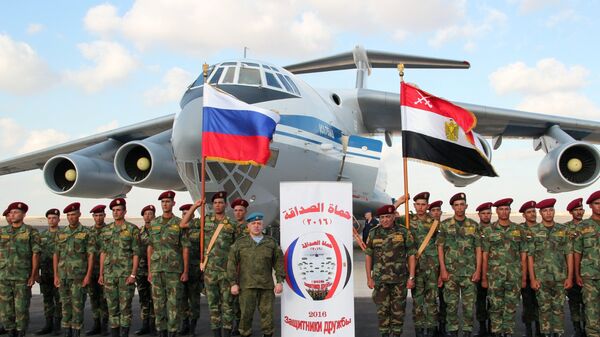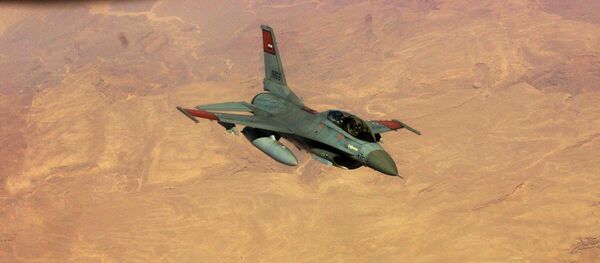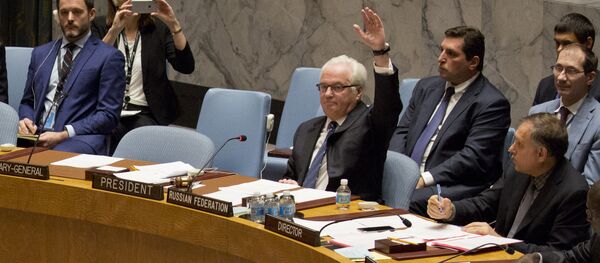The Russian Blue Berets landed in Egypt on Saturday aboard a military transport Il-76, flying out of the Diahilev airfield in Ryazan Region, about 150 km southwest of Moscow. The counter-terrorism drills, taking place at El Alamein, on the Mediterranean coast, will take place until October 26.
Helicopters, planes and heavy equipment, along with over 500 servicemen, are taking part in the drills, practicing the destruction of terrorist forces in desert conditions (including a coordinated paradrop involving up to 300 paratroops). Russian troops are decked out in the latest gear, including specialized desert uniforms and the latest military parachutes.
Officially, the drills are part of Moscow and Cairo's response to the instability plaguing the region, including Egypt's own Sinai Peninsula and neighboring Libya, which has been engulfed in chaos since the 2011 US and European intervention. It was over the Sinai in October 2015 that a Russian A321 en route from Sharm el-Sheikh to St. Petersburg exploded, killing all 224 passengers and crew onboard. Daesh (ISIL/ISIS) took responsibility for that attack.
Commenting on the improving prospects for Russian-Egyptian military cooperation, Svobodnaya Pressa contributor Andrei Polunin noted that naturally, "from the strict military perspective, there is not much point [for the Russian military] in carrying out joint operations with the Egyptians. But such efforts also have a political significance: Moscow considers it important to emphasize that it is moving closer to Cairo."

Recently, Russian media has even reported that Moscow is negotiating with Egypt regarding the lease and restoration of the Soviet-era base at Sidi Barrani, in western Egypt, near Libya. "If the negotiations succeed, the base may begin operations as soon as 2019," Polunin stressed. If the base materializes, Russia will receive another base in the Mediterranean to add to the one at Tartus, Syria.
Asked to comment on the significance of the ongoing airborne drills, and about just how far Cairo will be willing to go in cooperation with Moscow, Mikhail Alexandrov, a senior expert at the Moscow State Institute of International Relations' Center for Military-Political Studies, suggested that the drills are certainly a good start.
According to Alexandrov, it's crucial to understand that "Egypt is presently maneuvering between Russia and the West. Cairo wants to show its displeasure with Western countries over their attitude toward Egyptian President Abdel Fattah el-Sisi. It's worth recalling that after the June 30, 2013 revolution, Washington launched a 'comprehensive review' of its relations with Egypt, against the background of the removal of [Muslim Brotherhood] President Mohamed Morsi."
"By October 2013, the review of relations led to the termination of a US arms supply agreement. At the same time, the White House suspended the transfer of $260 million in aid to the Egyptian government, along with $300 million in loan guarantees. In September 2015, President Obama refused to meet with el-Sisi at the 70th session of the UN General Assembly."
Accordingly, the analyst noted, "now Cairo is demonstrating that it is prepared to expand cooperation with Russia almost to the level of the 1960s and 1970s –which was a period of the massive supply of Soviet military equipment to the North African country. Suffice it to recall that at that time, Cairo received 100 MiG-21s, 50 MiG-19s, 60 Su-7s, 20 Il-8s. Later, Egypt acquired 20 Tu-16s. The Egyptian Navy also received 24 vessels – submarines, destroyers, minesweepers, landing craft, missile and torpedo boats from the Soviet Union in this period."
Deepening diplomatic cooperation with Egypt is also beneficial to both sides, Alexandrov insisted. "By engaging in negotiations [on the lease of the Sidi Barrani base] we play along with Cairo's confrontation with the West. To us this is beneficial, showing the possibility of convergence with Egypt; this weakens the diplomatic positions of Western countries in the region, and shows that the countries of the region can shift toward Russia. In large measure, the joint Russian-Egyptian airborne training is just a small episode in a wider diplomatic and geopolitical game."
"It's no coincidence that Saudi authorities announced the creation of an alliance of Muslim countries to combat terrorism involving three dozen states [last year]. Under these circumstances, Russia cannot assure a permanent presence in the region if it continues to rely only on the Syrian factor. In order to prevent being squeezed out, we are building closer relations with Egypt and Turkey," the analyst explained.
"Another sign of convergence of Egypt with Russia was the recent vote on Syria at the UN Security Council. On October 8, Amr Abdellatif Aboulatta, Egypt's permanent representative to the UN, together with his counterparts from China, and Venezuela, supported the Russian resolution aimed at resolving the Syrian crisis. It was prepared as an alternative to a French document promoted by Western countries and Saudi Arabia."
Taking account of Russian diplomatic and military activity in and around Syria, Egypt, Turkey and Iran, the analyst suggested that all this speaks to one point: that Russia is starting to actively build up its presence in the Middle East, both militarily and politically.
Asked whether the US and Riyadh may make an attempt to bring Egypt 'to heel' and prevent further cooperation with Moscow, Tarasov suggested that while the two countries to provide significant financial support to Cairo, "Egypt's recent actions have shown that US influence in the Middle East [in particular] hasn't just been shaken, but has been weakened considerably." Ultimately, the analyst suggested that if Moscow wants to resolve problems associated with radical Islamic terrorism, it will need to have a strong foothold in the Mediterranean; to this end, enhanced cooperation with Cairo is a must.








